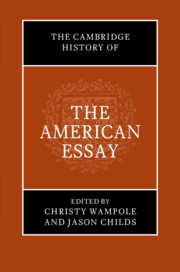Book contents
- The Cambridge History of the American Essay
- The Cambridge History of the American Essay
- Copyright page
- Contents
- Acknowledgments
- Notes on Contributors
- Introduction
- Part I The Emergence of the American Essay (1710–1865)
- Part II Voicing the American Experiment (1865–1945)
- 9 Writing Freedom before and after Emancipation
- 10 Social Justice and the American Essay
- 11 “Zones of Contention” in the Genteel Essay
- 12 The American Comic Essay
- 13 Nineteenth-Century American Travel Essays: Aesthetics, Modernity, and National Identity
- 14 American Pragmatism: An Essayistic Conception of Truth
- 15 The Essay in the Harlem Renaissance
- 16 The Southern Agrarians and the New Criticism
- 17 Subjective and Objective: Newspaper Columns
- 18 The Experience of Art: The Essay in Visual Culture
- 19 The Essay in American Music
- Part III Postwar Essays and Essayism (1945–2000)
- Part IV Toward the Contemporary American Essay (2000–2020)
- Recommendations for Further Reading
- Index
15 - The Essay in the Harlem Renaissance
from Part II - Voicing the American Experiment (1865–1945)
Published online by Cambridge University Press: 28 March 2024
- The Cambridge History of the American Essay
- The Cambridge History of the American Essay
- Copyright page
- Contents
- Acknowledgments
- Notes on Contributors
- Introduction
- Part I The Emergence of the American Essay (1710–1865)
- Part II Voicing the American Experiment (1865–1945)
- 9 Writing Freedom before and after Emancipation
- 10 Social Justice and the American Essay
- 11 “Zones of Contention” in the Genteel Essay
- 12 The American Comic Essay
- 13 Nineteenth-Century American Travel Essays: Aesthetics, Modernity, and National Identity
- 14 American Pragmatism: An Essayistic Conception of Truth
- 15 The Essay in the Harlem Renaissance
- 16 The Southern Agrarians and the New Criticism
- 17 Subjective and Objective: Newspaper Columns
- 18 The Experience of Art: The Essay in Visual Culture
- 19 The Essay in American Music
- Part III Postwar Essays and Essayism (1945–2000)
- Part IV Toward the Contemporary American Essay (2000–2020)
- Recommendations for Further Reading
- Index
Summary
This chapter analyzes the rich essayistic activity of the Harlem Renaissance (1919–1940). Through the visual arts, music, and literature, many African Americans responded to the changing national and international dynamics of the 1920s as an opportunity to leverage their creative arts and redefine their place within the nation. Poetry and fiction were the literary genres African Americans increasingly employed for these efforts. More ubiquitous was their frequent complement: the essay. Writers like Gwendolyn Bennett, Benjamin Brawley, W. E. B. Du Bois, Jessie Fauset, Zora Neale Hurston, James Weldon Johnson, Alain Locke, and Eulalie Spence infused the essay with this ethos and positioned it as an equally important genre for chronicling the period. Indeed, it was through the essay that readers in the United States and in other parts of the world encountered rhetorical styles reflecting the racial pride and determination of the “New Negro.” Essays from the period detailing the array of forces and ideas shaping African American life – including migration, racial violence, civil rights, and Pan-Africanism – constitute dynamic narratives combining history, opinion, and critical redress.
Keywords
- Type
- Chapter
- Information
- The Cambridge History of the American Essay , pp. 250 - 264Publisher: Cambridge University PressPrint publication year: 2023



